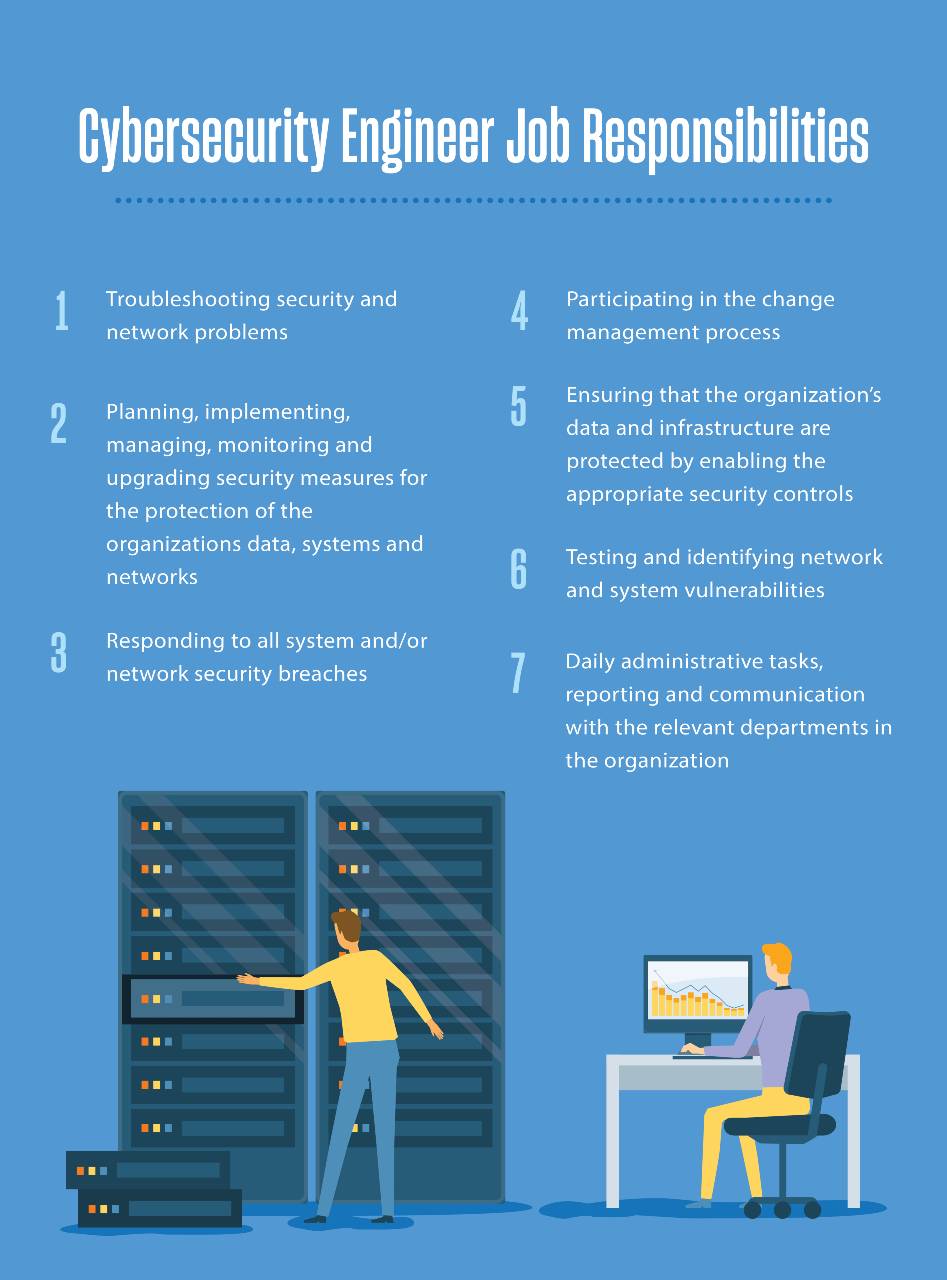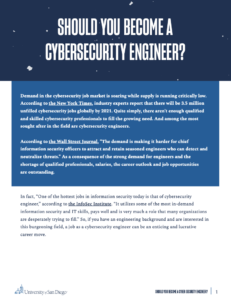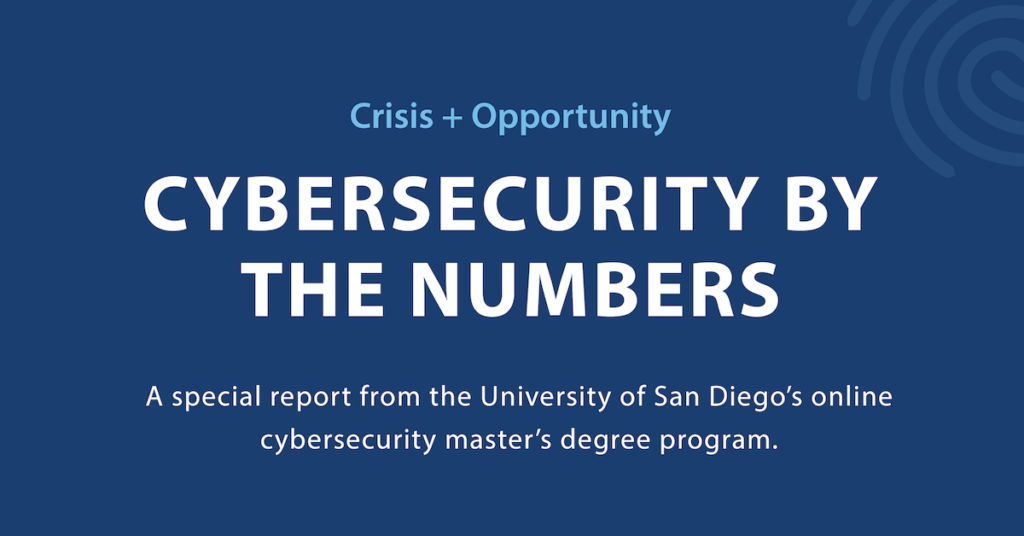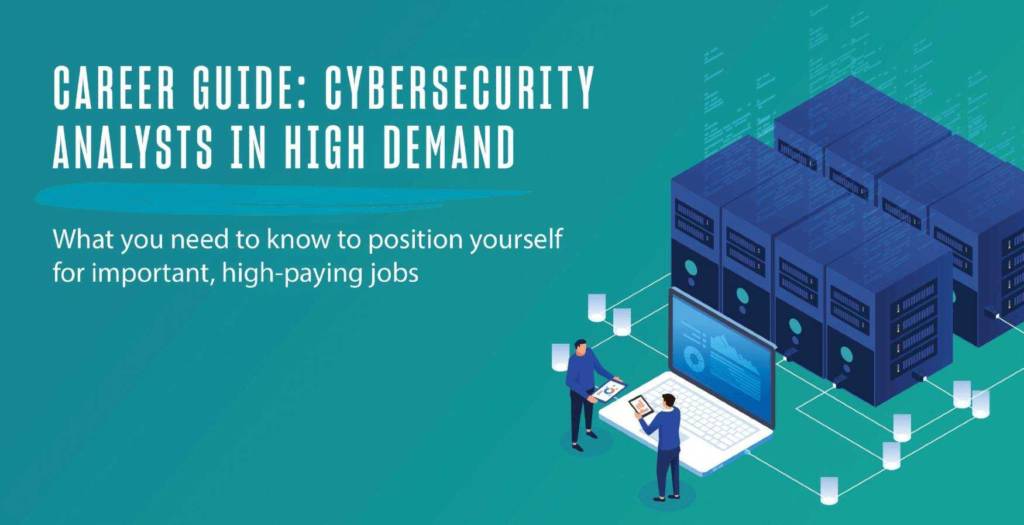Cybersecurity engineers are in high demand as cyber threats continue to escalate. Companies across industries are investing in skilled professionals to safeguard networks, secure data and prevent costly breaches. According to the U.S. Bureau of Labor Statistics (BLS), cybersecurity jobs are projected to grow 32% from 2022 to 2032, a rate far exceeding the average for all occupations.
This guide explores what cybersecurity engineers do, the skills and education required, salary expectations and the steps to launch a career in this critical field. If you’re considering becoming a cybersecurity engineer or looking to advance your career, this roadmap will help you understand what it takes to succeed.
[RELATED] 10 Reasons to Join a Cyber Security Master’s Degree Program >>
What is a Cybersecurity Engineer?
A cybersecurity engineer designs, builds and maintains security systems that protect an organization’s networks, data and digital assets. Their primary focus is strengthening defenses, identifying vulnerabilities and implementing measures to prevent cyberattacks. These professionals work across industries where safeguarding sensitive information is critical, including finance, healthcare, government and technology.
Cybersecurity Engineer vs. Other Security Roles
While cybersecurity engineers, analysts and architects all contribute to an organization’s security, their responsibilities and areas of focus differ significantly.
| Cybersecurity Engineer | Cybersecurity Analyst | Cybersecurity Architect |
| Develops and maintains security infrastructure, configures security tools and implements protective measures | Monitors systems for threats, analyzes security logs and responds to incidents | Designs overarching security frameworks and long-term security strategies for organizations |
Cybersecurity engineers focus on proactive defense, building secure systems that prevent cyber threats before they occur. Their technical expertise is vital for organizations looking to stay ahead of evolving security risks.
What Does a Cybersecurity Engineer Do?
Cybersecurity engineers develop and maintain security measures to protect IT infrastructure from cyber threats. Their role involves designing proactive defenses, assessing vulnerabilities and responding to security incidents to prevent data breaches and system compromise.
Cybersecurity engineers handle a range of tasks, including:
- Troubleshooting security and network issues to maintain system integrity
- Planning, implementing, managing, monitoring and upgrading security measures to protect an organization’s data, systems and networks
- Responding to security breaches and investigating incidents to mitigate damage
- Participating in the change management process to enhance security controls
- Ensuring data and infrastructure protection by enabling appropriate security measures
- Testing and identifying vulnerabilities in networks and systems to strengthen defenses
- Handling administrative tasks, reporting security findings and communicating with relevant departments to align security efforts
Cybersecurity Job Opportunities
The demand for cybersecurity engineers continues to rise as cyber threats grow more complex. Organizations across industries, from finance and healthcare to government and technology, need skilled professionals to protect sensitive data and critical infrastructure.
Job Growth and Industry Demand
Cybersecurity jobs are projected to grow 32% from 2022 to 2032, significantly outpacing the average growth rate for all occupations. Cybersecurity engineers are among the most sought-after professionals, with companies struggling to fill roles due to a persistent talent shortage.
A 2023 report from CyberSeek estimates that over 600,000 cybersecurity job openings remain unfilled in the United States, reflecting an urgent need for qualified professionals. Businesses and government agencies are prioritizing cybersecurity investments, leading to steady job creation and career advancement opportunities.
Specializations and Career Paths
Cybersecurity engineering offers multiple career paths, allowing professionals to specialize based on their skills and interests. Some common career tracks include:
- Cloud Security Engineer – Focuses on securing cloud environments and ensuring compliance with security best practices in AWS, Azure and Google Cloud
- Penetration Tester (Ethical Hacker) – Conducts simulated attacks to identify vulnerabilities before malicious actors exploit them
- Incident Response Engineer – Investigates and mitigates security incidents, working closely with digital forensics and threat intelligence teams
- Application Security Engineer – Ensures software and web applications are designed with security best practices to prevent vulnerabilities
- DevSecOps Engineer – Integrates security into the software development lifecycle, automating security controls within continuous integration and continuous deployment (CI/CD) pipelines
With the increasing adoption of artificial intelligence, Internet of Things (IoT) security and zero-trust architectures, cybersecurity engineers will continue to play a critical role in safeguarding organizations from emerging threats.
[RELATED] Download Your Free Guide to Becoming a Cybersecurity Engineer >>
Cybersecurity Engineer Hard Skills
Cybersecurity engineers need a strong technical foundation to design, implement and manage security solutions. Employers look for professionals with expertise in network security, encryption protocols and threat mitigation strategies.
Core Technical Skills
To succeed as a cybersecurity engineer, professionals must develop skills in:
- Network security – Understanding firewalls, VPNs, IDS/IPS (Intrusion Detection/Prevention Systems) and zero-trust security models
- Security tools and frameworks – Experience with Security Information and Event Management (SIEM) tools (e.g., Splunk, IBM QRadar), endpoint protection and threat detection platforms
- Operating systems and cloud security – Knowledge of Windows, Linux and macOS security, as well as securing cloud environments (AWS, Azure, Google Cloud)
- Encryption and identity management – Implementing multi-factor authentication (MFA), public key infrastructure (PKI) and secure access control measures
Programming and Automation
Scripting and automation are essential for identifying vulnerabilities, automating security tasks and responding to cyber threats. In-demand programming skills include:
- Python – Used for scripting security automation, penetration testing and malware analysis
- PowerShell – Common in Windows environments for automating security policies and monitoring system activity
- C/C++ – Helps in understanding low-level exploits and securing software at the kernel level
- Bash – Enables automation and security testing in Linux environments
Emerging Technologies
As cybersecurity threats evolve, engineers must stay updated on cutting-edge security practices, including:
- AI and machine learning for cybersecurity – Using predictive analytics to detect anomalies and automate threat responses
- DevSecOps and Infrastructure as Code (IaC) – Embedding security into software development pipelines and automating compliance checks
- Zero-trust architecture – Implementing security models that verify every access request, reducing attack surfaces
- Threat intelligence and digital forensics – Analyzing attacker tactics and collecting forensic evidence to improve response strategies
Mastering these skills enables cybersecurity engineers to protect organizations from evolving threats, secure critical systems and advance their careers in high-demand roles.
Cybersecurity Engineer Soft Skills
Beyond technical expertise, cybersecurity engineers need strong interpersonal and problem-solving skills. These skills help them communicate risks, collaborate with teams and respond effectively to security incidents.
Problem-Solving and Critical Thinking
Cybersecurity engineers must analyze security threats and devise effective solutions under pressure. They need to:
- Quickly assess security incidents and determine the best response strategies
- Think like an attacker to anticipate vulnerabilities and develop stronger defenses
- Apply logical reasoning to troubleshoot system vulnerabilities and misconfigurations
Communication and Collaboration
Cybersecurity engineers frequently interact with IT teams, executives and non-technical stakeholders. To ensure security measures are understood and implemented correctly, they must:
- Translate complex security concepts into clear, actionable insights
- Work closely with developers, system administrators and compliance teams to integrate security best practices
- Educate employees about cybersecurity risks and preventative measures
Adaptability and Continuous Learning
The cybersecurity landscape evolves rapidly, requiring engineers to stay ahead of emerging threats. Successful professionals:
- Regularly update their skills through certifications, workshops and hands-on experience
- Stay informed about the latest attack techniques and security solutions
- Adjust security strategies in response to new vulnerabilities and evolving business needs
A well-rounded cybersecurity engineer combines technical expertise with strong problem-solving abilities, effective communication and a commitment to continuous learning.
Cybersecurity Engineer Industry Certifications
Certifications help cybersecurity engineers validate their skills, improve job prospects and advance in their careers. Employers often require or strongly prefer candidates with recognized industry certifications. The best certifications vary based on experience level and specialization.
Entry-Level Certifications
Ideal for those starting in cybersecurity or transitioning into the field:
- CompTIA Security+ – Covers fundamental cybersecurity concepts, risk management and security best practices
- CompTIA CySA+ – Focuses on threat detection, analysis and response strategies
- GIAC Security Essentials (GSEC) – Verifies a broad understanding of cybersecurity principles, including network security and cryptography
Intermediate Certifications
Best suited for professionals with hands-on experience looking to specialize:
- Certified Ethical Hacker (CEH) – Teaches penetration testing and ethical hacking techniques
- GIAC Certified Incident Handler (GCIH) – Covers detecting, responding to and mitigating cybersecurity incidents
- Cisco Certified CyberOps Associate – Provides training on security operations, monitoring and network defense
Advanced Certifications
For experienced cybersecurity engineers in leadership or specialized technical roles:
- Certified Information Systems Security Professional (CISSP) – Demonstrates expertise in security architecture, risk management and security governance
- Offensive Security Certified Professional (OSCP) – Focuses on hands-on penetration testing skills
- GIAC Penetration Tester (GPEN) – Validates deep knowledge of penetration testing methodologies and advanced attack strategies
How Certifications Can Impact Career Growth
- Increase job opportunities by meeting employer requirements
- Boost salary potential, as certified professionals who can demonstrate advanced skills may earn higher wages
- Demonstrate expertise with in-demand, specialized areas such as penetration testing, cloud security, or incident response
While certifications are valuable, they should be paired with practical experience and continuous learning to stay competitive in the cybersecurity industry.
Cybersecurity Engineer Education
Education plays a crucial role in preparing cybersecurity engineers for the technical and strategic challenges of the field. While some professionals enter cybersecurity through self-study or bootcamps, most employers prefer candidates with formal education in cybersecurity, computer science or a related discipline.
Traditional Degree Paths
A bachelor’s degree is often the minimum requirement for cybersecurity engineering roles, providing a solid foundation in security principles, network defense and system architecture. Relevant degree options include:
- Bachelor of Science in Computer Science (CS) – Often seen as the most comprehensive and versatile degree, covering programming, system architecture, cybersecurity fundamentals and software development. It’s ideal if you’re seeking broad career options or planning advanced cybersecurity studies.
- Bachelor of Science in Cybersecurity – Provides specialized training in cyber defense strategies, ethical hacking and threat mitigation. This degree is great if you’re interested in directly applying for cybersecurity roles.
- Bachelor of Science in Information Technology (IT) – Emphasizes network management, security implementation and infrastructure support, preparing graduates for applied IT security positions.
Master’s Degree for Career Advancement
For professionals looking to advance into leadership roles or specialize in cybersecurity engineering, a master’s degree provides in-depth technical knowledge and industry-recognized credentials.
- Master of Science in Cyber Security Engineering – Prepares engineers to design, implement and manage secure systems
- Master of Science in Cyber Security Operations and Leadership – Focuses on governance, risk management and security strategy
At the University of San Diego, both programs equip professionals with advanced cybersecurity skills to protect critical infrastructure, secure networks and combat cyber threats.
Alternative Learning Paths
While many employers value degrees, other educational paths are just as viable in helping professionals enter cybersecurity engineering:
- Cybersecurity bootcamps – Short, intensive training programs that focus on hands-on cybersecurity skills
- Self-paced online courses – Platforms such as Coursera, Udemy and Cybrary offer training in security tools, ethical hacking and penetration testing
- Professional workshops and cybersecurity competitions – Capture-the-flag (CTF) competitions, security conferences and training workshops provide hands-on learning experiences
Experience Required for Cybersecurity Engineer Jobs
Many cybersecurity engineering roles require prior experience in IT, networking or security-related positions. While some entry-level opportunities exist, most employers prefer candidates who have developed hands-on expertise in threat detection, security protocols and incident response.
Common Entry Points
Professionals often start in foundational IT or security roles before transitioning into cybersecurity engineering. Common pathways include:
- Security Operations Center (SOC) Analyst – Monitors security incidents, responds to threats and analyzes attack patterns
- Network Administrator – Maintains network infrastructure, troubleshoots vulnerabilities and enforces security measures
- Penetration Tester – Conducts simulated cyberattacks to identify weaknesses in systems and applications
- Systems Administrator – Manages IT infrastructure and implements security updates to protect against threats
- IT Support Specialist – Provides technical assistance, gaining exposure to network configurations and security best practices.
Hands-On Training
Employers increasingly value hands-on experience over formal credentials alone. To build practical skills, aspiring cybersecurity engineers can:
- Work on open-source cybersecurity projects
- Participate in CTF competitions to refine hacking and defense techniques
- Use cybersecurity labs and simulation environments for real-world practice
- Engage in freelance security work or contribute to bug bounty programs
Some companies are shifting toward skills-based hiring, focusing on candidates with practical experience and problem-solving abilities rather than strictly requiring a degree. However, advanced education, such as a master’s degree in cybersecurity, can still provide a competitive edge and open doors to leadership roles.
Cybersecurity Engineer Salaries
Salaries for cybersecurity engineers vary based on experience, industry and location. According to Glassdoor, the estimated total pay for a cybersecurity engineer is $141,513 per year, with an average base salary of $111,781. Here’s a look at what you can expect to make, depending on experience level, industry and other factors.
Salary by Experience Level
- Entry-Level (0–3 years): $92,000–$167,000
- Mid-Career (4–9 years): $116,000–$222,000
- Senior-Level (10+ years): $162,000–$300,000+
Salary by Industry
Cybersecurity engineers work across various industries, with each offering different salary averages:
- Retail and wholesale: $143,720
- Information technology: $150,595
- Manufacturing: $143,215
- Human Resources: $140,893
- Aerospace and defense: $133,858
Factors That Influence Salary
- Certifications: Holding advanced certifications like CISSP or OSCP can increase earning potential (if you can demonstrate expertise in the certification areas; certification alone won’t cut it).
- Education: A master’s degree in cybersecurity can provide access to higher-paying leadership roles.
- Specialized skills: Expertise in cloud security, ethical hacking or threat intelligence is highly valued.
- Location: Salaries are often higher in major tech hubs, such as San Francisco, New York and Washington, D.C., compared to smaller cities.
For those looking to maximize earning potential, gaining hands-on experience, obtaining industry certifications and developing expertise in the latest technologies (think AI security or cloud security) are key strategies.
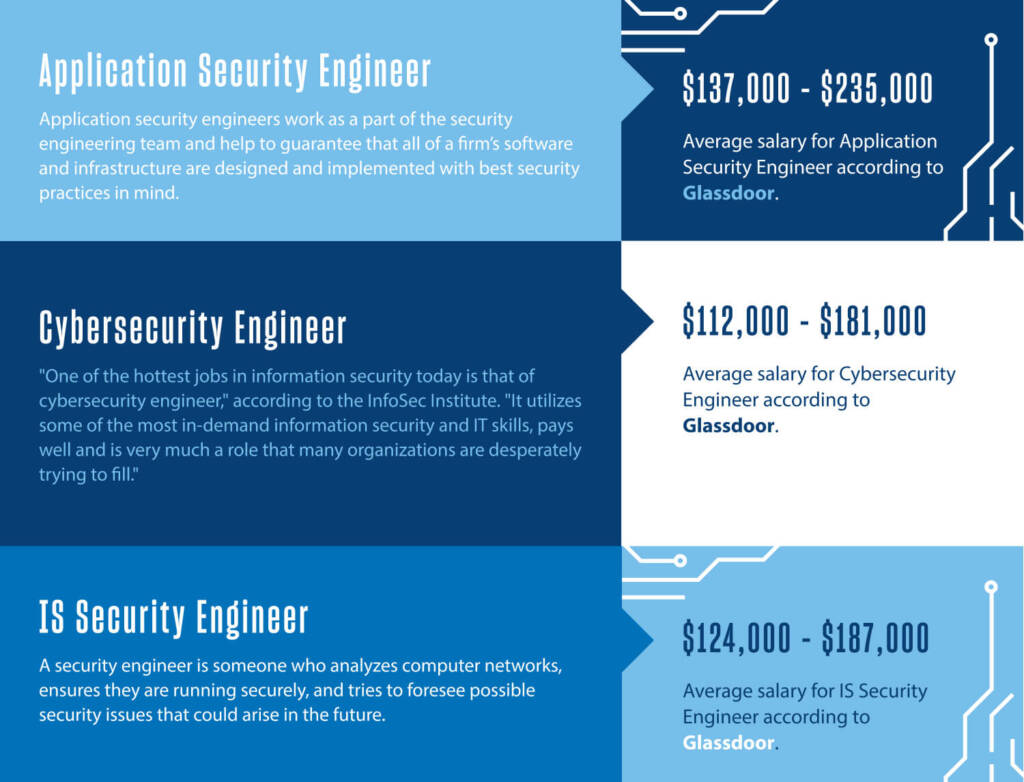
[RELATED] Which Cyber Security Program is Right For You? Download our free infographic to help decide >>
7 Steps to Becoming a Cybersecurity Engineer
Becoming a cybersecurity engineer involves a combination of education, practical experience and certifications. Here’s a structured approach to entering the field:
1. Determine if Cybersecurity Engineering is Right for You
- Research the role, responsibilities and skills required
- Explore different cybersecurity specializations to find the best fit
2. Get a Relevant Degree
- A bachelor’s degree in computer science, cybersecurity or IT provides a solid foundation
- A master’s degree in cybersecurity engineering can enhance job prospects and earning potential
3. Gain Practical Experience
- Work in IT support, networking or security-related roles
- Build technical skills through cybersecurity labs, penetration testing or bug bounty programs
4. Earn Industry Certifications
- Entry-Level: CompTIA Security+, CompTIA CySA+
- Intermediate: Certified Ethical Hacker (CEH), GIAC Security Essentials (GSEC)
- Advanced: CISSP, Offensive Security Certified Professional (OSCP), GIAC Penetration Tester (GPEN)
5. Develop Technical and Soft Skills
- Master security tools, programming languages and network defense strategies
- Strengthen communication and problem-solving skills for effective collaboration
6. Build a Cybersecurity Portfolio
- Showcase security projects, vulnerability research and technical expertise
- Contribute to open-source projects or publish cybersecurity blogs
7. Network and Apply for Jobs
- Attend cybersecurity conferences, join professional groups and connect with industry professionals
- Apply for cybersecurity engineering positions through job boards, company websites and referrals
Companies Hiring Cybersecurity Engineers
Cybersecurity engineers are in high demand across industries. Some of the top employers looking for cybersecurity talent include:
Tech and Software
- Microsoft
- Apple
- Amazon
- Meta
Financial Services
- JPMorgan Chase
- Goldman Sachs
- Wells Fargo
- American Express
- Citigroup
Government and Defense
- National Security Agency (NSA)
- Federal Bureau of Investigation (FBI)
- Department of Homeland Security (DHS)
- U.S. Department of Defense (DoD)
Healthcare and Retail
- UnitedHealth Group
- CVS Health
- Kaiser Permanente
- Walmart
- Target
Additionally, cybersecurity engineers can find opportunities at consulting firms, startups and managed security service providers (MSSPs). The demand for skilled professionals continues to grow, with remote work opportunities also expanding in this sector.
How to Find Cybersecurity Engineer Jobs
Job seekers can explore multiple avenues to find cybersecurity engineering roles:
1. Search Job Boards and Websites
- General: LinkedIn, Indeed, Glassdoor
- Cybersecurity-specific: CyberSecJobs, Cybercareers.gov, InfoSec Jobs
2. Join Networking and Professional Groups
- Attend cybersecurity conferences like Black Hat, DEF CON and RSA Conference
- Join LinkedIn groups and online cybersecurity communities
3. Optimize Your Resume and Online Presence
- Highlight relevant skills, certifications and hands-on experience
- Use keywords that align with job descriptions for Applicant Tracking Systems (ATS)
4. Leverage Internships and Apprenticeships
- Gain experience through government cybersecurity initiatives or private-sector internship programs
5. Consider Contract Work and Freelance Security Roles
- Many cybersecurity positions, including penetration testing and security consulting, offer freelance and contract-based opportunities
Other Cybersecurity Careers You Might Be Interested In
Cybersecurity engineering is one of many career paths in the field. Other high-growth cybersecurity roles include:
- Security Risk Analyst – Evaluates potential cybersecurity risks, conducts risk assessments and develops strategies to mitigate threats before they impact an organization
- Cybersecurity Compliance Manager – Ensures that an organization meets industry regulations and compliance standards such as NIST, ISO 27001 and GDPR
- Embedded Systems Security Engineer – Focuses on securing hardware and firmware in IoT devices, medical equipment and industrial control systems
- Cybersecurity Researcher – Investigates emerging threats, vulnerabilities and attack techniques, often contributing to security advancements through whitepapers and threat intelligence reports
- Forensic Analyst – Specializes in digital forensics, investigating cybercrimes, data breaches and insider threats to uncover evidence for legal or organizational response
- Industrial Control Systems (ICS) Security Engineer – Protects critical infrastructure such as power grids, manufacturing systems and water treatment plants from cyber threats
- Red Team Operator – Conducts advanced adversarial simulations to test an organization’s ability to detect and respond to real-world cyberattacks
- Cybersecurity Sales Engineer – Works with security vendors to help businesses implement security solutions, providing technical expertise on cybersecurity products and services
Advance Your Cybersecurity Career at USD
Cybersecurity engineering provides job security, high earning potential and opportunities for career advancement. As cyber threats grow more sophisticated, companies need professionals with the skills to protect critical systems. With the right education, hands-on experience and industry-recognized certifications, you can position yourself for high-paying, in-demand cybersecurity roles.
The Master of Science in Cyber Security Operations and Leadership and the Master of Science in Cyber Security Engineering at the University of San Diego offer advanced training for those looking to accelerate their careers and take on leadership roles in cybersecurity.


